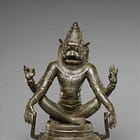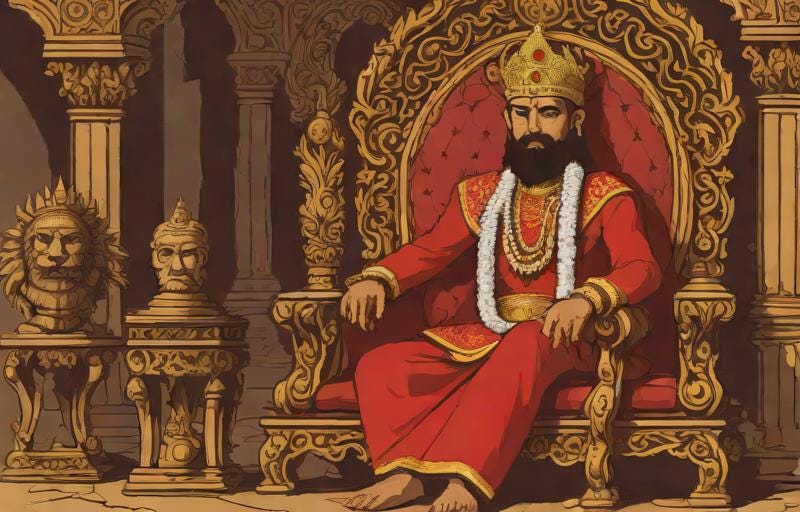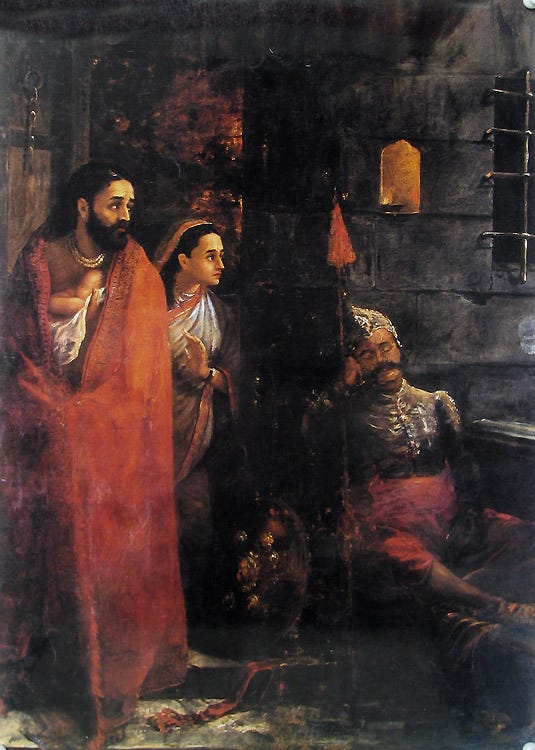
I retold this ancient story below on how evil is outwitted despite its best intentions to dominate the world. I have unlocked it from the archive as the free read of the week.
I retell a different story today that illustrates this truth once again.
Once upon a time, long ago, a beautiful and virtuous Princess, as is often the case in such tales, married a benevolent young Prince of another kingdom.
Joy showered its blessings on the peoples of both realms as they reveled in the fortunate partnership of the two Royal families.
As is customary, the Princess embarked on a grand royal procession accompanied by her friends and family to begin her new life with the Prince in his land, bidding farewell to her father’s home.
She sat with the Prince in an open chariot, enabling the crowds from her kingdom to rejoice and bless her new start in life.
The princess’s brother loved her dearly. To show his love and respect, he decided to drive the chariot carrying his beloved sister, and her husband for the initial part of the journey.
An imposing man, with a thick long mustache, his form resembling a warrior, he sat happily driving the chariot, beaming at the crowds, and turning back to smile at his sweet sister and his fine brother-in-law.
What to say of the joy of the sister? Her family had showered her with love and blessings, and the citizens of her kingdom had come out in strength to bid her goodbye. Though sad at leaving her nest, she had married a Prince she loved, a happy circumstance that she could not have designed better to start her new life. Her brother was now driving their chariot, a unique honor.
So, they went, the three of them immersed in their thoughts, reflecting on their good fortune, and eagerly anticipating the gifts of the future.
Halfway through this journey, with the crowds slowing their path, the brother was suddenly addressed by a laughing celestial voice in the sky,1 “What a fool you are! Happily driving your sister and her husband, not knowing that the eighth-born child of your sister will be the cause of your death.”
Hearing this frightening prediction, his love for his sister dissolved into fear and anger. He halted the chariot, unsheathed his sword, and leaped into the open carriage with the intent to end her life.
She cried out at this sudden turn of events, pleading with her brother for mercy.
Her husband also rose, trying to prevent his brother-in-law from acting on his impulse. He implored him to spare his wife's life.
The brother wavered, confronted by the tear-stricken beauty of his sister, looking at him in fear, hands folded in prayer.
In an instant, the entire atmosphere shifted from gaiety to silence, and a cloud of fear settled upon the crowd. The army, loyal to the brother, kept them at bay as they watched in horror at what was unfolding.
The young Prince, seizing on the momentary hesitation on the brother’s face, reassured him and reminded him that they had just been married. The celestial voice had warned against a child, but his sister was not yet a mother.
A brave warrior, such as he, should not be known for killing an innocent woman, especially his sister, based on a voice in the sky. Thus, he calmed the fears of the troubled brother, emphasizing again and again that it was his sister and she would never bring harm to him.
The brother’s breathing slowed, and he calmed down from his impulsive drive to murder his sister.
However, his fears were far from allayed. Driven by this fear, he sought to quell the prophecy before any harm could befall him.
Then, in a desperate bid to save his wife's life, the Prince reluctantly agreed to surrender every child born to the couple to the wife’s brother. He hoped that time would calm the brother down, and perhaps, he might spare his nephews.
Being a man of his word, the Prince trusted that his commitment would quell the brother's immediate impulse to end his sister's life.
The evil brother relented, sparing his sister, but imprisoning the couple and his father, ascending to the throne as the new King. Thus, the bride for a day became a prisoner for life.
In time, a child was born to the couple. The infant's cries alerted the guards posted outside the cells. Hastily, the guards rushed to inform the evil King.
The mother cradled the innocent baby until the King arrived at her cell, and the father, ignoring her cries, handed the baby over to the King.
The sister pleaded with her brother to spare her son, emphasizing that he is not the eighth-born. However, fear dominated the mind of the evil King, and he was reluctant to take the chance. What if the akashvani was wrong, and it was not the eighth son but the first?
Enveloped by the darkness in his mind, the evil brother, took the baby from the hands of the parents. Walking a few steps away, he callously dashed the infant against the stone walls, ending its life.
The horrified parents, mute spectators to the sound of their firstborn's death, consoled each other, resigned to facing even worse days ahead.
So it began. Each newborn baby’s cry awakened the guards, who rushed to inform the King. Blind to every need but his own, the King came personally to their cell. Without mercy, he took the child from the father and killed it in a similar cruel fashion.
As each child was born, the mother grew frightened of the sounds the baby would naturally make, for she longed to hold her son a little longer before the cruel end awaited him. She hugged her son close and pleaded with her husband to spare him each time. Alas, the husband had given his word, and in those ages, truth was implicit in a man’s given word.
So, six babies were killed by the evil King. With each birth, his anxiety grew, rendering him sleepless and restless until he held the eighth-born and ended the baby’s life.
The pleasures of the world no longer appealed to him. Trapped in his own mind, fearful of the future, and unable to live in the present, he was as much a prisoner as those he sought to imprison.
In the cell, the Prince consoled both his wife and himself, reminding her to have faith in a greater Power. He spoke of the dreams they had seen, which promised an end to this evil.
Through a divine magical transference, the seventh fetus was moved from the sister’s womb to the first wife of the Prince. She lived far away in a large village under the protection of the village chieftain, who was a trusted friend of the Prince. There, the boy was born and raised with love, shielded from his uncle’s evil gaze.
The evil King heard that the sister had a miscarriage, but was not satisfied with that answer. It also meant that the eighth son’s birth was near. Consumed by this thought night and day, he impatiently awaited the news of the birth of his nemesis.
As time passed, the cruel King’s actions cast a gloom among the kingdom and its citizens. Bereft of power and frightened by the threats of the King’s army, the citizens awaited Divine relief, as is usually the case with the powerless.
The imprisonment and the death of their six children had taken their toll on both parents. The Prince thought, “What a poor father I am,” forgetting that he was indeed the reason the sister was saved. The boy who would fight evil one day was protected because of the father’s quick thinking on the day of the wedding.
Which mother could tolerate the death of six of her children in front of her? Such a fate, the sister withstood, trusting in the unseen, in a belief that her faith would be honored by a power greater than she possessed in that frail moment.
But the prayers and faith of the innocent, do bear fruit, albeit slowly.
One night, the kingdom was struck by a thunderous storm, lightning crackled, the gates shook with the wind, and the prison cells were made scarier with the sounds of the sky.
The Prince and his wife looked at each other concerned with the unnatural weather outside. They wondered whether the storm would be able to mask the cries of their newborn. The mother, torn between the excitement of meeting her eighth-born and the fearful anticipation of what fate awaited, had spent the night in anguish.
Thus, on a tumultuous night, with a torrential downpour, thunder and lightning fiercely competing with each other, the eighth son of the couple was born at the stroke of midnight, a time when most people in the world were asleep, oblivious to the momentous event.
In the dark cell, lit only by the flickering lights of oil-lamp, and the smell of hay covering the ground on which the Princess slept, this baby opened his eyes and smiled, with utter disregard for his meager surroundings.
The parents held him tight, kissing his forehead and his cheeks, struck by his blissful ignorance. The mother pleaded with the father for a few more minutes of joy, to watch the baby boy with a face resplendent and glowing despite the darkness, radiating a charm that could not be hidden from any evil uncle.
Hence, the father's despair. What was he to do? How could he protect this baby? Heavy iron chains clung to his body and his feet, granting him just enough freedom to pace within the cell, but no more.
The baby smiled at him without any concern. The father peered anxiously, waiting for the guards to appear, and wondered how long it would be before they heard the cries of the baby.
But the baby did not cry; instead, it made gurgling noises, smiling at the parents, delighted to be held and cosseted.
Unable to bear the thought of separation, the mother insisted on holding her son again and pouring all of her love into that moment. Her fears for his safety propelled the speed of her actions.
The father went closer to the cell bars and strained to hear the guards' steps, but none came. He remained puzzled. The storm continued unabated, raining heavily, as though the heavens had started to camouflage the sounds of the baby.
An insight occurred to him, as though a divine voice spoke to him in that moment.
Without any warning, the father's chains fell away, and in an instant, he was free.
The cell doors unlocked with a click.2
The shocked Prince looked at his wife in amazement, and he knew then that his inner voice was guiding him on what he had to do.
He took the baby from his wife, searched for something to hide him in, and, finding nothing in that bare cell except for a woven basket with their clothes, co-opted it.
Though small, he did his best to wrap the baby warmly in the basket, even if its legs hung outside a tad.
Showing the baby one last time to his wife, he placed the basket on his head and gingerly walked out, hoping to escape the guards.
But, to his surprise yet again, he found the guards fast asleep, clearing his path to the outside. He walked briskly, despite not encountering any guards, fueled by the fear that someone might yell at him to stop at any moment.
The kingdom bordered a ferocious river, which would safely take him to his friend, the chieftain’s village, where his first wife also lived.
But the unrelenting rains and thunderstorms slowed his progress. At last, he reached the river bank and looked for a way to cross the river, yet no boat or human figure was in sight.
Without fear, a special trait of parents everywhere, the father began to enter the river, hoping that Providence would make his crossing possible.
The rain lashed his face relentlessly, and he worried about the exposed arms and face of the baby. What he did not know was that from the moment he entered the river, a five-headed serpent3 followed the father shielding the baby from the rain just as though the Gods had held an umbrella over the basket.
But even then, the river waters swelled higher and higher, almost submerging the Prince, closing in on the basket and enveloping the little one’s feet dangling outside. Just as suddenly, as though meeting its aim, the river receded, easing the way for the father to walk through. Crossing safely, he reached his friend’s house.
The village lay in peaceful slumber, unusually quiet as earlier at the prison. The father made his way to his friend’s house. Finding the doors unlocked, he entered the house. He knew for certain that he was being aided by the Divine. A celestial voice had suggested to him earlier that he exchange his son with his friend’s baby, born that very night.
Inside, he found the baby in a wooden cot, surrounded by a sleeping maid and mother. Leaving his playful son in the cot, he picked up the baby and, as he was about to leave, he glanced at his son. Seeing the child smile, his heart became heavy. He lingered an extra moment, holding his friend’s baby close in his arms, and then carefully placed the infant in the basket.
As he made his way back, not a soul stirred in the village, the river was calm, the prison guards were still asleep, and the door to his cell was ajar.
He then woke his wife, informing her of the success of his mission. Once he was inside, the cell automatically locked, and the baby he had brought back uttered a loud wail, as newborns are wont to do.
The guards were immediately awakened, and they rushed to the evil King to inform him. The King was glad; at last, he could have some peace and sleep at night, he thought. Hastily dressing, he came to the cell and received the baby from his brother-in-law.
Upon this, involuntarily, his sister cried out, pleading with him to spare the baby because it was not a boy after all but a girl, and the prophecy had said nothing about a girl.
But the King was not in the mood to accept this bit of logic. The eighth-born remained a threat - whether boy or girl did not matter. Who knew what the celestial voice had meant?
Merciless, he lifted the hours-old baby high inside the same cell, intending to end its life.
When he threw it against the wall, the baby slipped from his hands. Instead, it revealed itself as the Preserver-God’s illusory force, ‘Maya,’ appearing as a fearsome Goddess.
Laughingly mocking him, she announced that his enemy was safe elsewhere and would return one day to end his life. With that, she disappeared.
The parents were finally relieved to witness this turn of events. However, the King was left unfulfilled in his wish to decimate his enemy.
At first, the King sent demons throughout the land to find and kill all newborns less than a year old.
No amount of plotting, planning, imprisoning his sister and her husband, threatening the kingdom with violence, and killing all of the land’s newborns yielded the baby who would eventually return to kill him and free his parents.
The evil King never slept a wink again peacefully.
Did you enjoy this retelling? Stay tuned for future posts, where I will explore specific adventures and stories from Krishna's childhood, its mythological significance, and its enduring cultural impact.
Notes:
Each year, the birth of the baby, Krishna, is celebrated throughout India at midnight, when temples are open for worship. He is worshipped as a child, both in homes and in temples dedicated to Him.
The parents of Krishna, are believed to have prayed for thousands of years to experience being God’s parents and were granted their prayer in this birth. Yet, they did not experience the joy of raising him.
The river Yamuna (near Delhi), rose to touch the baby’s feet as a gesture of worship. In another telling, the river Yamuna wanted to absolve her sins by touching Krishna’s feet.
Krishna is a significant incarnation of the Preserver-God, and, along with Rama, holds a central place in Hindu worship. He is considered the most complete incarnation.
Krishna’s childhood is adorned with numerous famous adventures and stories that have become folklore, celebrated even to this day.
Many mothers in India visualize their babies as baby Krishna, compare antics to resemble those of Krishna’s as a baby, and some even dress up their infants as Krishna for school competitions.
One of Krishna's distinctive features is his mischievous and ever-smiling countenance, evident both in his childhood and as an adult. He is known for playfully pranking others and possessing a worldly wisdom not seen in his earlier incarnations.
Known as akashvani = ‘akash’ = sky; ‘vani’ = speech.
A cause of Maya, the illusory force of the Preserver-God. Check the archives for other stories of the Preserver-God.
A simpler form of the thousand-headed serpent, on which rests the Earth (a la Atlas) and which is the bed of the Preserver-God.







Jayshree, Another cultural gem. D
I’ve heard these stories long ago, and have been fascinated by them ever since. Beautiful 💙💫